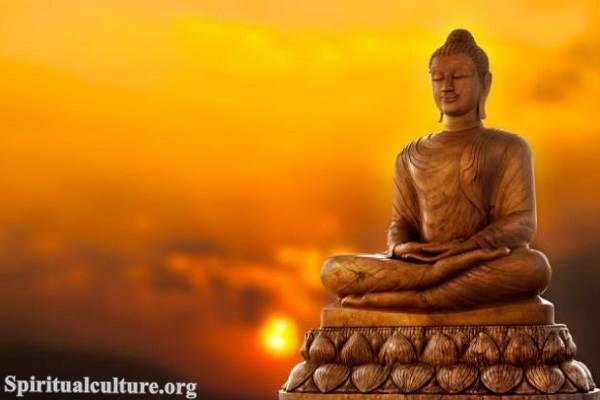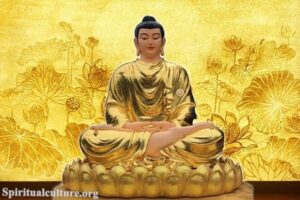Buddhism basic beliefs
Buddhism is a religion and philosophy that originated in ancient India. It is based on the teachings of Siddhartha Gautama, who is known as the Buddha or “Awakened One.”

The basic beliefs of Buddhism can be summarized in the Four Noble Truths and the Eightfold Path.
The Four Noble Truths are:
- All beings are suffering (Dukkha)
- Suffering is caused by craving and desire (Tanha)
- Suffering can be overcome by eliminating craving and desire
- The path to the elimination of suffering is the Eightfold Path
The Eightfold Path is:
- Right understanding (Samma ditthi)
- Right intention (Samma sankappa)
- Right speech (Samma vaca)
- Right action (Samma kammanta)
- Right livelihood (Samma ajiva)
- Right effort (Samma vayama)
- Right mindfulness (Samma sati)
- Right concentration (Samma samadhi)
According to Buddhism, following the Eightfold Path can lead to the end of suffering and the attainment of enlightenment, a state of perfect knowledge, understanding, and compassion.
Buddhism practices
The practices of Buddhism include meditation, ethical conduct, and the study and understanding of the Buddha’s teachings. These practices are intended to help individuals gain insight into reality’s true nature and develop compassion and wisdom.
Buddhism can be practiced by anyone, regardless of religion or background. It is a flexible and inclusive tradition that can be adapted to fit the needs and circumstances of individual practitioners.
Buddhism has many different schools and traditions, each with its unique teachings and practices. Some of the most well-known traditions include Theravada Buddhism, which is the oldest surviving form of Buddhism and is practiced primarily in Southeast Asia; Mahayana Buddhism, which is the dominant form of Buddhism in East Asia; and Vajrayana Buddhism, also known as Tibetan Buddhism, which is practiced in Tibet and the Himalayan regions.

Buddhism has significantly influenced the cultures and societies of the countries where it has been practiced. Its teachings and practices continue to be a source of inspiration and guidance for many people worldwide.
Some of the key practices in Buddhism include:
- Meditation: Meditation is an important practice in Buddhism, and many different techniques are used to cultivate mindfulness and awareness. Some common types of meditation in Buddhism include mindfulness meditation, concentration meditation, and loving-kindness meditation.
- Ethical conduct: Buddhists strive to follow the Five Precepts, which are guidelines for ethical behavior. The Five Precepts are: to abstain from taking life, to abstain from taking what is not given, to abstain from sexual misconduct to abstain from false speech, and to abstain from intoxicants.
- Study and understanding of the teachings: Buddhists seek to understand the teachings of the Buddha and apply them to their own lives. This may involve reading and studying the texts, attending teachings and lectures, and discussing the teachings.
- Service and community involvement: Many Buddhists believe in the importance of helping others and engaging in service to the community. This may involve volunteering, donating to charitable causes, or simply offering help and support to those in need.
- Cultivation of virtue: Buddhists seek to cultivate virtues such as compassion, loving kindness, and generosity. This may involve engaging in practices such as giving to others, practicing forgiveness, and cultivating an attitude of gratitude.
Buddhism is a way of life that anyone can practice, regardless of their background or circumstances. Its teachings and practices offer a path toward inner peace, understanding, and a more fulfilling life.
What are the 4 main beliefs of Buddhism?
The four main beliefs of Buddhism are:
- The Four Noble Truths: These truths outline the basic principles of Buddhism and explain the suffering that exists in the world and how to overcome it. The Four Noble Truths are that suffering exists, suffering arises from craving and attachment, suffering can be overcome, and the path to the end of suffering is the Eightfold Path.
- The Eightfold Path: This path is the way to end suffering and attain enlightenment, or nirvana. The Eightfold Path consists of the right understanding, right intention, right speech, right action, right livelihood, right effort, right mindfulness, and right concentration.
- Karma: This is the belief that a person’s actions have consequences, either in this life or in a future life. Good actions lead to good consequences, and bad actions lead to bad consequences.
- Reincarnation: This is the belief that a person’s consciousness, or soul, is reborn after death into a new body. This cycle of death and rebirth is governed by the law of karma, and it is believed that one can escape the cycle through enlightenment.
Buddhist beliefs about the god
Buddhism is a religion and philosophy that originated in ancient India and is based on the teachings of Siddhartha Gautama, who is known as the Buddha. One of the central tenets of Buddhism is the concept of non-self, which means that there is no permanent, unchanging self or soul. This means that the concept of a traditional monotheistic god, such as the Abrahamic God of Judaism, Christianity, and Islam, is not central to Buddhist beliefs.
Buddhists do not believe in a personal god who created the world and intervenes in human affairs. Instead, they believe in a universal law or principle called Dharma, which governs the universe’s natural order and can be understood through spiritual practice and wisdom.
However, some schools of Buddhism do incorporate deities and supernatural beings into their belief systems. For example, Tibetan Buddhism includes a pantheon of deities and deities, and many Buddhists in East Asia pay homage to bodhisattvas, who are enlightened beings who have chosen to remain in the cycle of rebirth to help others achieve enlightenment.
In general, Buddhism emphasizes the importance of personal responsibility and the potential for individuals to achieve enlightenment through their own efforts rather than relying on the intervention of a deity.





